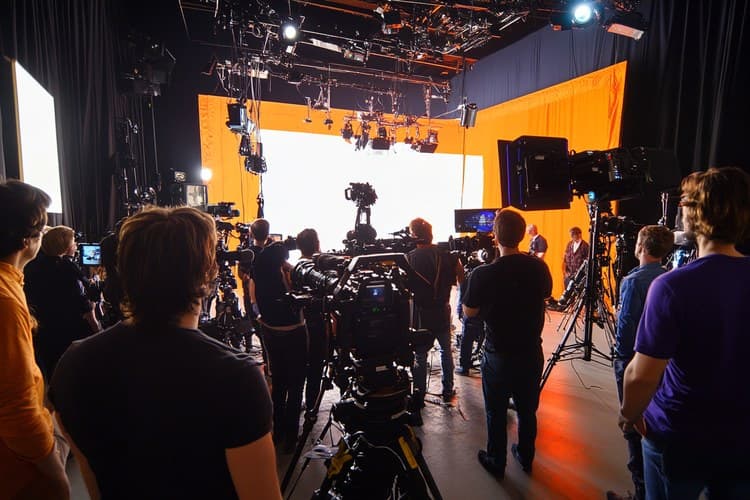Exploring the Vibrant World of Film Production Workshops in the US
The US film industry offers aspiring filmmakers a range of enriching opportunities through dynamic film production workshops. These workshops provide comprehensive training in scriptwriting, cinematography techniques, acting, and film editing basics. Participants also gain hands-on experience in directing actors and mastering lighting for film, while networking events open doors to industry connections.

The Importance of Film Production Workshops
Film production workshops serve as crucial stepping stones for both novice and seasoned filmmakers. They are designed to provide an immersive experience that covers the multifaceted aspects of filmmaking. Participants are not only taught the theory behind successful film production but are also given the chance to apply what they learn in a practical setting.
These workshops are vital because they offer a controlled environment where individuals can experiment with different filmmaking techniques under the guidance of experienced mentors. This hands-on experience is invaluable, as it prepares aspiring filmmakers for the challenges and demands of the film industry.
Moreover, workshops often simulate real-world production scenarios, allowing participants to understand the dynamic and collaborative nature of filmmaking. By working on group projects, attendees learn to communicate effectively, solve problems creatively, and manage time efficiently—skills that are essential in any film production environment.
Key Components of a Film Production Workshop
Scriptwriting Classes
Scriptwriting is the foundation of any film project, and workshops provide detailed classes that focus on developing this essential skill. Participants learn how to construct compelling narratives, create engaging characters, and write impactful dialogue. Workshops often include exercises that help writers understand pacing, structure, and how to effectively build tension and emotion in their scripts.
In addition, scriptwriting classes emphasize the importance of rewriting and refining drafts. Participants are encouraged to share their work with peers and mentors to receive constructive feedback, fostering a collaborative environment where creativity can flourish.
Cinematography Techniques
Cinematography is the art of visual storytelling, and workshops dedicated to this craft are crucial for anyone looking to capture captivating images on film. Participants learn about camera operation, shot composition, and how to use movement and angles to enhance the narrative.
Cinematography workshops also delve into the technical aspects, such as understanding different types of lenses, lighting setups, and camera settings. By experimenting with these elements, aspiring cinematographers develop an eye for detail and learn how to convey mood and emotion through visuals.
Acting for Film
Acting workshops provide participants with the tools to bring characters to life on screen. These sessions focus on techniques that help actors deliver authentic performances, such as method acting, improvisation, and character analysis.
Actors learn how to interpret scripts, understand subtext, and build believable characters. The workshops often involve scene work and monologues, where participants perform in front of peers and receive feedback from instructors. This practice helps actors refine their skills and gain confidence in their ability to convey complex emotions.
Film Editing Basics
Editing is where the magic of film truly comes together, and workshops in this area teach participants how to shape raw footage into a cohesive and engaging story. Attendees learn about various editing software tools, as well as techniques for cutting, sequencing, and adding special effects.
Workshops also cover the principles of continuity, pacing, and rhythm, which are crucial for maintaining the flow of a film. By working on editing projects, participants develop a keen sense of timing and learn how to enhance the narrative through creative decision-making.

Networking Opportunities in the Film Industry
One of the most significant benefits of attending film production workshops is the opportunity to network with industry professionals. Workshops often feature guest speakers, panel discussions, and networking events that allow participants to connect with filmmakers, producers, and other key players in the industry.
Networking is an essential component of building a career in film, as it can lead to collaborations, job opportunities, and valuable mentorships. By engaging with industry professionals, participants gain insights into current trends, best practices, and the realities of working in film.
Conclusion
Film production workshops in the US offer a comprehensive and practical education for aspiring filmmakers. By participating in these workshops, individuals gain valuable skills in scriptwriting, cinematography, acting, and editing, while also building a network of industry contacts.
Whether you're just starting in the film industry or looking to enhance your existing skills, these workshops provide the tools and knowledge necessary to succeed. With dedication and the right training, the vibrant world of film production is within reach for those who are passionate about storytelling and the art of cinema.
Disclaimer: The information provided in this article is for educational and informational purposes only. Prices are accurate as of the publish date and may vary over time.